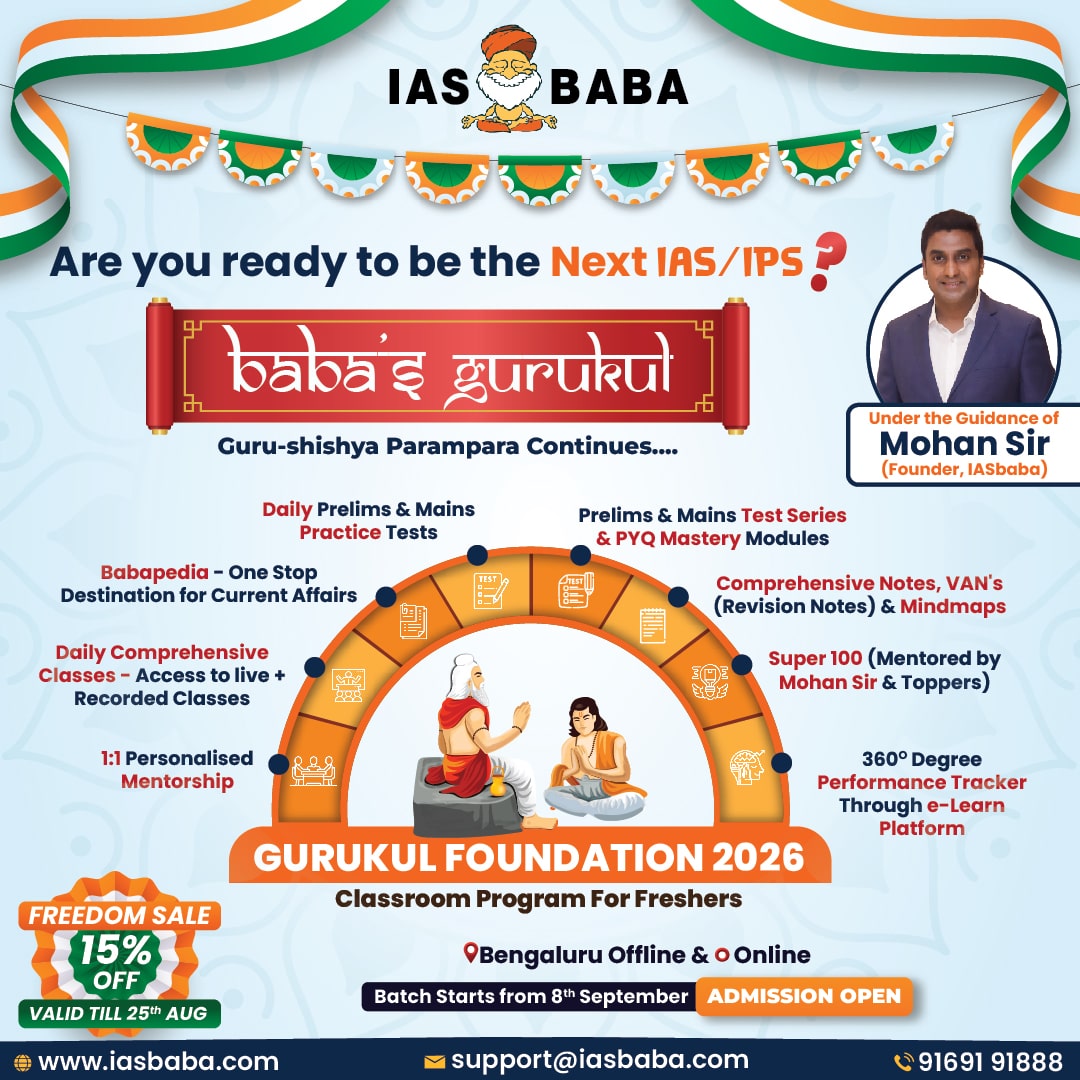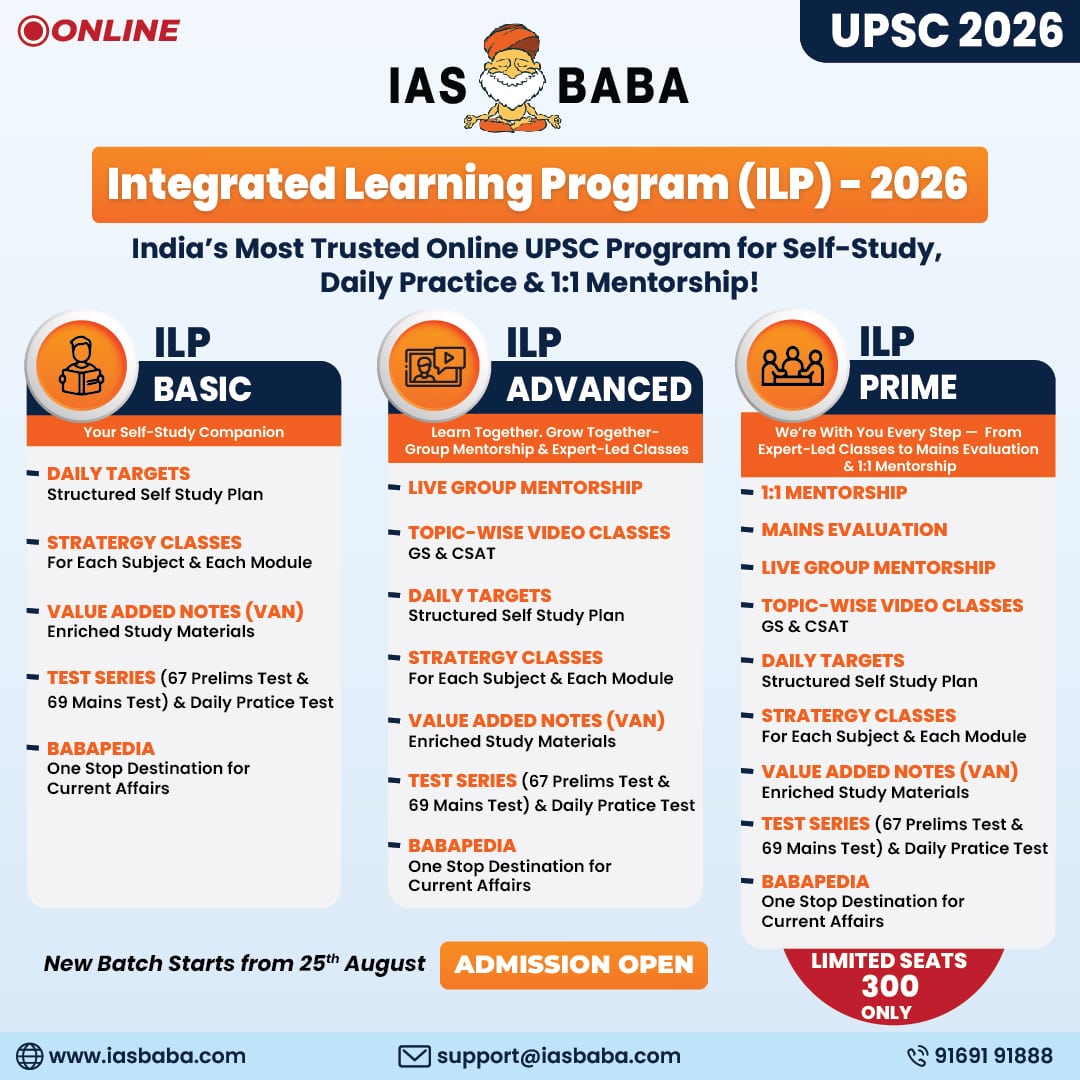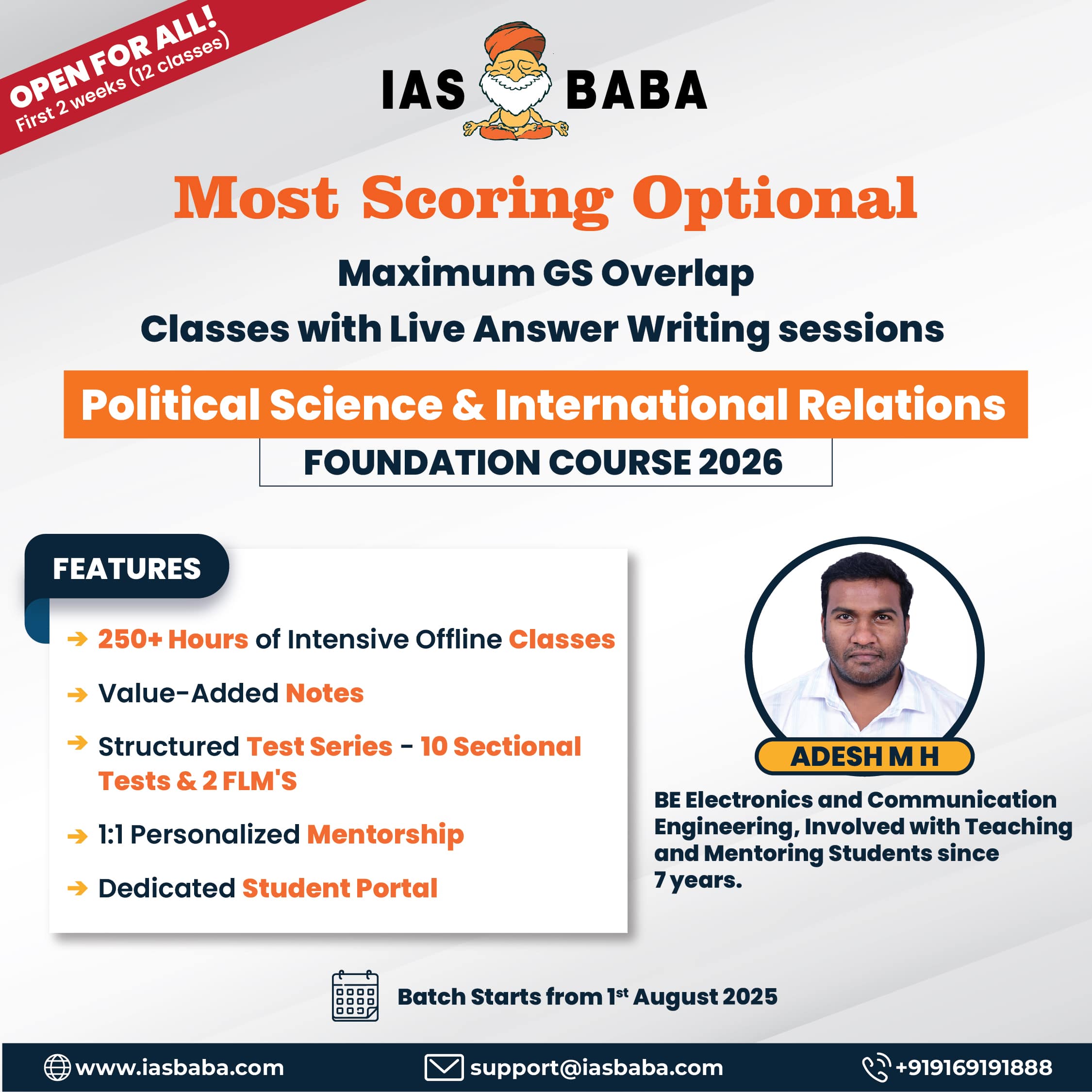IASbaba's Hot Questions, IASbaba's Think Learn Perform 2016, IASbaba's TLP - 2016, Think Learn Perform (TLP)- 2016, UPSC Mains Answer Writing - 2016, UPSC Mains Questions 2016
IASbaba’s TLP 2016 [4th March]: UPSC Mains GS Questions [HOT]: Synopsis
1. What are your views on homosexuality? Do you think section 377 of the IPC is out of sync with the social reality today? What approach would you suggest to address the issue? Discuss.
Introduction:
- Define homosexuality: Homosexuality literally means, ‘homo’ that is same and sexuality which represents sexual orientation of a person.
- Write about the traditional view of modern history.
- Trace homosexuality regarding Indian history: mentioned in Rig Veda, Arthashastra, Kamasutra by Vatsayana, Khajuraho temple sculptures etc.
Your views:
- Give your stand: Example- Homosexuality is not a mental illness or an aberration to society but rather a natural sexual orientation of a person which doesn’t need a cure but the recognition and proper rights.
- Support your stand basing it on India: being the most diverse country of the world throughout history, acceptance of homosexuality has ever remained a part of India’s social and cultural setup. But a country is also determined and shaped by its invaders. Coming of the British reversed the reasoning of acceptance of homosexuality.
Section 377:
- The de-criminalization of the section 377, reinstating the criminal nature of the same and decision by Supreme Court of India to setup a committee to revise its decision just in a span of 5-6 years, is a proof in itself that the section 377 is not in sync with social reality.
- Recognition and relegation of rights to homosexuals around the globe gave the much –needed moral courage to the homosexuals in India to come out in the open and demand their rights.
- Article 14, Article 15, Article 19 and Article 21 are contradictory to section 377.
- Naz foundation can be mentioned.
Approach:
- Sensitization by govt. Bodies and various NGO’s.
- Awareness and education by various forms of media.
- Legislative support.
- Social support. Example- allowing homosexuals to adopt kids, allowing same-sex marriages.
- Medical support to overcome the stigma of society and get cured for STDs and HIV/AIDS.
Conclusion:
- De-criminalization of section 377 of IPC is the first step to recognize them and empower them as part of the Indian society and culture.
- (Some more concluding remarks can be given.)
Best answer: HappyIAS
Homosexuality means attraction between the same sexes. It is perceived to be unnatural as this orientation doesn’t bode well with the majority i.e. ‘heterosexuality’. Since they are a minority, they are continuing to be repressed and oppressed by the majority even in today’s modernized world.
Section 377 of the IPC criminalizes homosexuality by stating ‘carnal intercourse’ as against the law of nature. It is a colonial legacy which should have been shunned when India got independence. The Delhi High Court decriminalized homosexuality in a landmark judgement in 2009 (Naz foundation) but it was again upheld by the Supreme Court in 2013. Section 377 is out of sync with the societal reality today because:
-It violates fundamental rights guaranteed by the Indian constitution viz. Art 14 & 15 (Equality), Art 19 (freedom of expression of sexuality) and Art 21 (dignified life).
-Other progressive nations such as USA and Europe have decriminalized it.
-Minorities – linguistic, regional, religious, etc. have got new voice in the new world order with the help of civil societies.
Way forward:
-Homosexuality should be legalized so that this minority doesn’t face atrocities from the public as well as the police.
-Mass awareness programmes should be conducted to educate people that it is natural, not a disorder but just another expression of sexuality.
-They should be focused upon in the mainstream policy making and social welfare programmes. For ex: Job reservation.
India is a vibrant democracy where everyone has the right to live a dignified life. Majority shouldn’t decide for a minority whether they have the right to live the life of their choice or not. Therefore, the draconian Sec 377 must be struck down.
2. It is difficult for the economy to take off unless politically difficult decisions are taken. What do you understand by this statement? Substantiate your answer by citing examples from the latest economic survey.
- Intro :
- Write briefly about the difficulties of working in a democracy and how vested interests and subsidies can affect policy and decision making
- Body :
- Capping of no of LPG cylinders : Capping No of LPG cylinders to 10 from current 12 per year per household. The subsidy payout on LPG in 2014-15 was Rs 40,551 crore, which this fiscal will be less than half as petroleum prices have slumped to a six-year low. During April-December, the subsidy outgo was Rs 12,092 crore.
Protectionist policies hindering growth: protectionism results in barriers to free movement of skill and data. Increased mobility is being misconstrued as immigration problem because of such policies - The chakravyuha challenge: ease to enter barriers to exit , where in there is no option for exit from the business even the units are sick. Benefits being pocketed by larger firms, which is leading to increase in direct and indirect subsidy. Also the problems faced by its labourers
- Reforms in labour laws which might create trade union strikes but nonetheless have to be taken
- Gradual pruning and Rationalization of subsidies: As subsidies on 6 commodities gas, kerosene, railways, gold aviation turbine fuel and power which amount to 1lakh core are mostly cornered off by the well off households, the ES suggests use of ICT along with JAM for better targeting and delivery
- Taxation on agricultural income.
- Taxation of PPF : the government currently follows EEE (Exempt-Exempt-Exempt) model for employees provident fund contribution.ES suggests EET (Exempt-Exempt-Tax) model, where by 60% of the income will be taxed at the time of withdrawal ,which is in line with the New Pension Scheme which follows EET (Exempt-Exempt-Tax) model
- Fertilizer subsidy: the ES says that the subsidy in the fertilizer has to be rationalized and targeted via JAM for increasing productivity, and reducing regional imbalances and environmental problems, the fertilizer subsidy is dominated by Urea which corners 70% of fuel subsidy
- Taxation:currently only 5 per cent of the people who earn paying tax and only 15.5 per cent of the net national income being reported to the tax authorities
- Though it should be closer to 23 per cent, and 85 per cent of the net national income fall outside the tax net. The tax to GDP ratio at 16.6%, as a result, is well below that of the emerging market economies of 21 per cent.
- GST: ES talks about expeditious roll out of GST .It talks about reasonable taxation irrespective of background of individuals whether from service, real-estate ,Agriculture or industry.
- Disinvestment: the survey says that the disinvestment process must be expedited though it may create labour unrest.
- Conclusion :
- Write about what you think of these suggestions
- Also give any suggestions that you can think of
Best answer : Madster
Economic development requires decision making cannot fulfill the aspirations of all, considering the diversity of the nation. Various political parties ,pressure groups ,businesses etc oppose and make it difficult to implement decisions which are not populist in nature. The success of politically difficult decisions is visible from the successful implementation of The New Eco Policy of 1991
The latest eco survey highlighted some sector where taking politically difficult decisions has become a necessity
Public Finance–>ES has suggested to remove the tax incentives for small savings as they mostly benefit the rich. It has also recommended more tax on gold which is a popular form of investment amongst Indians. This will prevent hoarding of gold. Also a wider property tax has been suggested to reap the benefits of growing real estate sector on account of smart cities. This will provide the much needed public finance for the future growth of urban cities
Prices and Monetary Management
Crop wise yields in India are low as compared to other countries. This is mainly because of agri extension services are focused mainly on few crops. There is a need for shift towards demand driven extension services
Taxes–>They have a direct impact on the professional working class and hence we generally see a fall in the tax slabs in every budget .But the ES has proposed widening the tax net from 5.5% of earning individuals to more than 20%.It has also suggested to raise tax exemption thresholds and phasing them out gradually .Also the implementation of GST should be done as soon as possible
Banking and Corporate Sector–>ES has suggested de stressing of balance sheet of both banks and companies though ARCs and professionals. even though the burden is born by the taxpayers directly or indirectly. It has also pointed out the poor performance of 6 integral sectors- mining ,coal, iron and steel ,textiles ,infra and aviation
Trade–>introspection needed on issues including its continued support to farmers. It also bring forwards cases of unpopular reforms like taxing agriincome, rationalizing fertilisers subsidy and removal of tax benefits which benefit the rich
Subsidies–> it has identified certain areas–>small savings schemes, kerosene, railways, electricity, LPG, gold, fertilizers and aviation turbine fuel–>where the benefits are incurred by the well of people .The recent fall in oil prices can be utilised to shell out these subsidies
The recent restructuring of LPG and reducing the diesel subsidies utilizing the low oil prices factor shows the advantage of politically difficult decisions. Hence they need to be taken to reach the eco growth targets
3. Do you think civil society has a role to play in law making? In a democracy like India, what role would you envisage for the civil society in legislative functions? Discuss by citing examples from the recent past.
Introduction (Includes 1st Part)
India has representative parliamentary democracy leaving the decision-making to a small group of elected representatives. This could result in government ‘of’ the people becoming a government ‘off ’ the people. Progressive marketisation of traditional government functions has widened this gap. There is a gap between the not-so-efficient state and the profit-alone-matters private sector which needs a third sector to bridge it. This is how civil society is seen today and it plays a vital role in law making.
2nd Part – Focus on what should be the role of civil society in legislative functions
- People’s effective participation, transparency, responsiveness, consensus orientation, equity and inclusiveness, the rule of law, effectiveness and efficiency, accountability, and strategic vision – all these constitute the bedrock of democracy.
- Recently, the traditional government has failed to produce appreciable impact on the quality oflegislative functions.
The emphasis now is on Civil Societies to play an effective role (facilitating external pressure from citizens on the system) to improve the above (1) and (2)
Civil Society’s functional contribution should be
- Watchdog — against violation of human rights and governing deficiencies.
- Advocate — of the weaker sections’ point of view.
- Agitator — on behalf of aggrieved citizens.
- Educator — of citizens on their rights, entitlements and responsibilities and the government about the pulse of the people.
- Service provider — to areas and people not reached by official efforts or as government’s agent.
- Mobiliser — of public opinion for or against a programme or policy.
3rd Part – Discuss the above points comprehensively with suitable recent examples for each
Appropriate Conclusion
Best answer: Vajrasattva
Civil society is a democratizing force of public action with an unquestionable intent towards common good. It comprises of both unorganized and organized groups like NGOs, social collectives, religious groups, think tanks, universities, mass media, etc. those are not agencies of the government and not motivated by profit.
Civil society is an essential contributor to the development realization of democracy and human
rights. It form a crucial component of participation in an open, democratic society through engaging large numbers of individuals. Hence it has a role in making need for a legislative reform felt, a legislation being passed by consultations and can also play key role in monitoring the implementation
In a democracy like India civil society could have the following roles:
- Co-Operative & Consultative Role: CSOs & Govt could work in cooperation with each other in making legislations. Also CSOs could play unbiased role of consultant in important law making processes. It could provide feedback about existing lacunae in a law according to demands of citizen
Ex. 1. The National Advisory Council (NAC), composed of influential members of civil society
provided inputs to make landmark legislations, like the Right to Information Act, MGNREGA and the Forest Rights Act.
Ex. 2. In2010, the Ministry of Finance organized a pre-budget consultation with civil society.
- Civil society could also give representation to the parliamentary & drafting committees and thus contribute to the legislative functions.
Ex. Centre for Science and Environment an NGO, has been represented on every committee drafting environment-related laws
- Policy advocacy: CSOs could initiate policy advocacy to make Acts on some important issues.
Ex. Right to Information, Domestic Violence etc, NAZ foundation for LGBT rights
- Medium of communication: During law making civil societies can make govt. aware about citizen’s demand in law making like it happened in Domestic violence bill.
- Pressurization: Put pressure on govt. to pass new legislations or make amendments which are in urgent need for the society at large.
Ex. Recent passage of Juvenile justice bill, and demand for strong legislation for RAPE
- Alternative law formation: Civil societies can create an alternative format for a bill without any influence of political parties. As happened in 2011 in case of jan lokpal bill.
- They could be theDriving Forcein slowing down the agenda of liberalization and clearance of precarious projects to guard the rights of indigenous and marginalized people. Ex As it happened in Niyamgiri ,Odisha & Narmada Bachao Andolan
Some of these organizations, especially those providing valuable services for marginalized sections of society, have done outstanding work and deserve to be included in the policymaking process.














